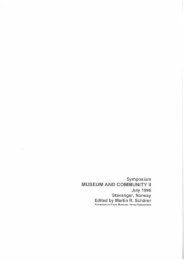Key Concepts of Museology - ICOM
Key Concepts of Museology - ICOM
Key Concepts of Museology - ICOM
You also want an ePaper? Increase the reach of your titles
YUMPU automatically turns print PDFs into web optimized ePapers that Google loves.
48<br />
which mobilises diverse technologies<br />
around the collections exhibited<br />
to give visitors the means to better<br />
understand certain aspects <strong>of</strong> these<br />
and to share in their appropriation.<br />
The term thus touches on the neighbouring<br />
museological concepts <strong>of</strong><br />
communication and museum public<br />
relations, and especially interpretation,<br />
very much present in the Anglo-<br />
Saxon museum world and on North<br />
American sites where it overlaps<br />
to a great extent with the notion <strong>of</strong><br />
mediation. Interpretation, like mediation,<br />
assumes a divergence, a distance<br />
that must be overcome between that<br />
which is immediately perceived and<br />
the underlying meanings <strong>of</strong> natural,<br />
cultural or historical phenomena.<br />
Like means <strong>of</strong> mediation, interpretation<br />
materialises in interpersonal<br />
human actions and in aids which<br />
enhance the straightforward display<br />
<strong>of</strong> exhibited objects to suggest their<br />
meaning and importance. Born in the<br />
context <strong>of</strong> American natural parks,<br />
the notion <strong>of</strong> interpretation has since<br />
expanded to mean the hermeneutic<br />
nature <strong>of</strong> the experience <strong>of</strong> visiting<br />
museums and sites. Thus it can be<br />
defi ned as a revelation and unveiling<br />
which leads visitors to understand,<br />
and then to appreciate, and fi nally to<br />
protect the heritage which it takes as<br />
its object.<br />
In the end, mediation comprises<br />
a central notion in a philosophy<br />
which is hermeneutic and refl ective<br />
(Paul Ricœur). It plays a fundamental<br />
role in each visitor’s quest for selfknowledge,<br />
a knowledge facilitated<br />
by the museum. When the viewer<br />
stands face to face with works produced<br />
by other humans it is through<br />
mediation that he or she can arrive at<br />
a special subjectivity which can inspire<br />
self-knowledge and understanding<br />
<strong>of</strong> one’s own human adventure.<br />
This approach makes the museum,<br />
the custodian <strong>of</strong> the evidence and<br />
signs <strong>of</strong> humanity, one <strong>of</strong> the best<br />
places for this inescapable mediation<br />
which, in <strong>of</strong>fering contact with<br />
the world <strong>of</strong> cultural works, leads<br />
each person on the path <strong>of</strong> a greater<br />
understanding <strong>of</strong> self, and <strong>of</strong> reality<br />
as a whole.<br />
DERIVATIVES: MEDIATION, MEDIATOR, TO MEDIATE.<br />
CORRELATED: ACTIVITIES, EDUCATION,<br />
INTERCESSION, INTERPRETATION, POPULARISATION,<br />
PUBLIC RELATIONS, VISITOR EXPERIENCE.<br />
MUSEAL<br />
adj. – Equivalent in French: muséal; Spanish:<br />
museal; German: museal; Italian: museale;<br />
Portuguese: museal.<br />
The word has two meanings in<br />
French (one when it is used as an<br />
adjective to qualify ‘museum’ and<br />
another when it is used as a noun),<br />
but only one in English, where it has<br />
been rarely used until now, to qualify<br />
a fi eld covering more than the classical<br />
notion <strong>of</strong> ‘museum’. The museal<br />
fi eld covers not only the creation,<br />
development and operation <strong>of</strong> the<br />
museum institution but also refl ections<br />
on its foundations and issues.<br />
The museal fi eld <strong>of</strong> reference is characterised<br />
by a specifi c approach,
















